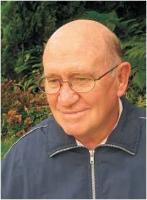
Right Reverend Duncan Buchanan began his studies towards a Bachelor of Arts in Theology and English in 1954. He then attended the General Theological Seminary of New York and obtained his Masters in Divinity. His deep interest in the welfare of all South Africans and his compassion for humankind was evident from the very outset of his career.
While studying further as a Fellow and Tutor Seminary the heartrending events of the Sharpeville Massacre unfolded and he broke off his studies to return home and assist at St Paul’s Church in Durban. In 1962 he became the Rector of the Parish of Kingsway, on the south coast of then Natal. He was also Warden of the Fellowship of Vocation in the Diocese of Natal and helped those who believed they were called to the ordained ministry to discern whether they had or not.
In 1966 he returned to Grahamstown as the Vice-Principal of St Paul’s Theological College and in 1974 was appointed as the Archdeacon of Albany. Then in 1976 he became Principal of St Paul’s for 10 years and was the Chairman, Internal Examiners of the Joint Board for the Diploma in Theology.
In 1986 came a move to Johannesburg as Dean of St Mary’s Cathedral. Shortly after taking up this position he was chosen to succeed Nobel laureate Archbishop Desmond Tutu as the Bishop of the Anglican Diocese of Johannesburg. Asked whether his style will differ from Tutu’s, Buchanan responded: “It’s difficult to say. I am not Bishop Tutu. I would hope I’d try to be myself.” Declaring that it was inevitable that he would speak out against apartheid laws requiring racial separation, he said that this had been the stance of the Anglican Church of South Africa for the past 30 years. He is also recognised and respected for his support of the ordination of women into the Anglican Church. He served as Bishop until 2000.
He was awarded an Honorary Doctorate by the General Theological Seminary of New York in 1987. He became Chairperson of the Church Unity Commission and was also involved in initiating the Johannesburg Church Leaders’ forum. He also became a member and later Chairman of the SA Anglican Theological Commission and the Theological Education by Extension College.
With great sensitivity Buchanan oversaw the reclamation of the parish of Christ the King following its restoration to the Anglican Church in 1997. The parish had been abandoned and then sold in the late 60s following population removals. Archbishop Thabo Makgoba was quoted as saying: “We thank God for Bishop Duncan who gave leadership, guidance and encouragement through the complex and often painful process of reclaiming this church. In 1998 he performed the extremely difficult task of being Chairman of the Section on Human Sexuality at the Lambeth Conference, which is held every 10 years to give all the national Anglican churches the opportunity to gather and resolve policy conflicts. Hearing all the Bishops widely varying views on homosexuality he said that he had not expected the strength of their anger. He added that he respected their right to be angry and that peeling away “the suspicions, the misunderstanding and the misperceptions” is hard work: “One of the things we have learned in South Africa is that you can start by being hugely polarised but that doesn’t mean that’s where you’ll end up.”
In 2006 St John’s College awarded him the prestigious “Eagle Award” for his services to South Africa, the Church and St John’s College. He still serves as Bishop’s Representative on the Council of St John’s.
Buchanan has had a long association with Grahamstown and Rhodes as Vice-Principal and subsequently Principal of St Paul’s Theological College, and as Archdeacon of Albany. He has also worked tirelessly to support Rhodes in his capacity as a long serving member of the Board of Governors and also as Chairman of the Johannesburg Rhodes University Bequest Association since it inception. In his personal capacity Buchanan has continued over the years to donate to the University on a regular basis.
